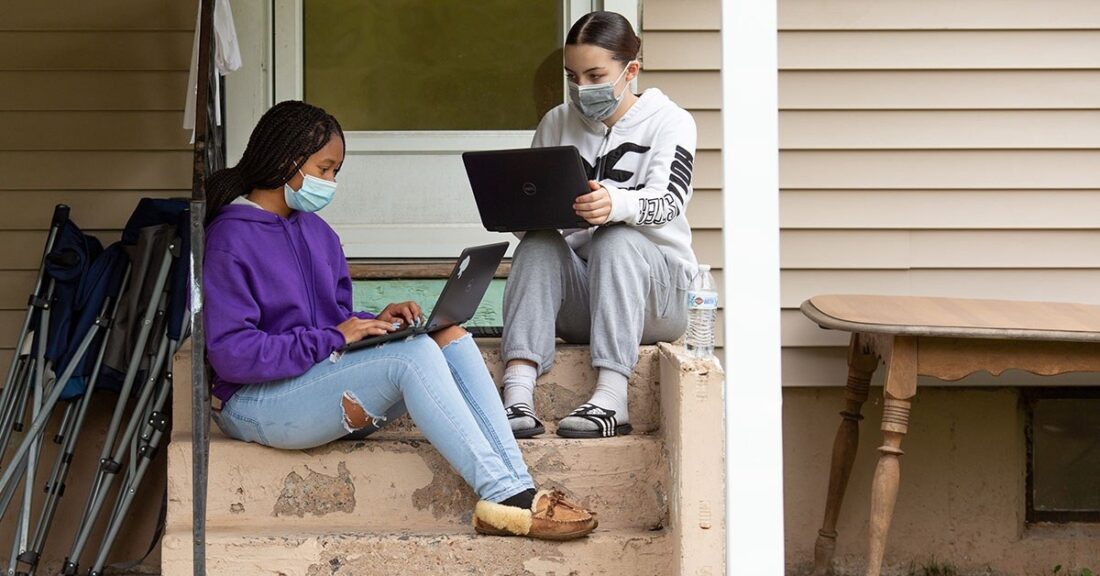COVID-19 Survey: Insights for Policymakers on Supporting Families

Photo by Allison Shelley for EDUimages
A nationwide survey, conducted by Brookings with support from the Annie E. Casey Foundation, explores how Americans are coping with the disruption of the COVID-19 pandemic and offers insights for policymakers to advance equity in supporting children, young people and families.
Conducted by the IPSOS research firm in March 2022, the survey queried 1,015 people about COVID-19, exploring their sense of control over their lives and what help they need to support their families’ success. The survey found that the pandemic had been especially difficult for women, young people and Black and Latino respondents, and that people in these groups and those earning less than $50,000 annually were particularly in need of policies that support improved well-being. Overall, respondents identified lack of access to sufficient income, health care and quality jobs as their top challenges in the wake of the pandemic.
“Finding a quality job was challenging before the pandemic began,” writes Brookings Senior Fellow Camille Busette, the director of Brookings’ Race, Prosperity and Inclusion Initiative, who oversaw the survey. “Everyone needs a quality job, but it is clear that two years into the pandemic, that need is most acute for Latinx and Black households.”
The survey responses echo national data from the U.S. Census Bureau’s Household Pulse Survey that show while peak parental unemployment levels have partially recovered since the early days of the COVID-19 pandemic, many families still are facing serious economic difficulties. The February 2022 Household Pulse Survey found that 23% of U.S. households with children lost employment income in the past month.
Survey Findings: How Americans Feel During the Pandemic
The Brookings survey documented that many Americans feel they have lost control of their lives. Women were more likely to feel that way, with 26% responding they had lost control, compared to 19% of men. Among young people ages 18 to 34, almost 30% reported feeling a loss of control.
More Support Needed
The survey also documented what respondents need to support their families. Slightly more than half (53%) of those surveyed said they need more income. Among Black and Latino respondents, 60% said they needed more income.
The survey results also highlighted the need to expand access to good health care:
- About 20% of Black and 27% of Latino respondents said they need better health care.
- Thirty% of people ages 18 to 34 and 25% of those earning less than $50,000 said they need better health care.
Policy Responses
In a blog post about the survey findings, Busette recommends several policy responses, including:
- expanding Medicaid eligibility in states. Eight of the 12 states that have not expanded Medicaid eligibility have large percentages of residents who are people of color;
- using federal funding from the American Rescue Plan Act to improve access to affordable, high quality health care and mental health services; and
- using federal funds and other resources to create more affordable housing with easy access to amenities that will attract good jobs.
“These findings remind us of how deeply the COVID-19 pandemic has upended lives and highlights the urgent needs facing so many families, especially low-income families and families of color,” says Karina Jimenez Lewis, Casey’s associate director of Policy Reform and Advocacy and acting director of Equity and Inclusion. “Young adults are struggling to take control of their lives and need our support to gain solid footing as they start out. In making decisions about how to support young adults and their families, policymakers must address all of these factors to truly support well-being and success for the next generation of parents and workers.”
Additional Resources on Families and the Pandemic
Casey has supported a range of reports and data collection efforts related to the pandemic’s effects, including Kids, Families and COVID-19 and the 2021 KIDS COUNT Data Book. A broad dataset about families and children is available at the KIDS COUNT Data Center.






